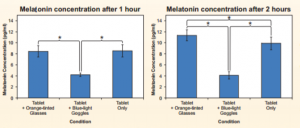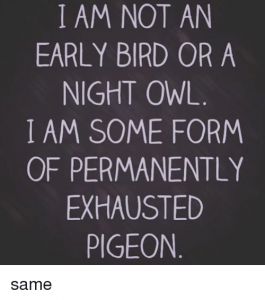We use them everyday, we use them to talk to our friends, forward emails, and finding information that we need in a flash. Yes , Im talking about that fancy cell phone in your pocket, but did you know that your cell phone is affecting you in more than one way? Cell phone use can affect the amount of sleep..
When we use our phone, the light that the screen emits, also known as “blue light” is recieved by the rods and cones the interpret light in our eyeball. Normally, when we use our cell phones during the day, it does not affect us because we are wide awake, however the problems begin whenever we try to go to sleep. According to a study done by the Lighting research Center tested the effect the blue light would have to the level of melatonin that the body produces, which helps the body regulate it’s natural circadian rhythm or sleep cycle. When performing the experiment, the researchers tested how melatonin levels where affected not only by the lenght of exposure to the blue light emmited from a tablet and the distance that the tablet was held from the face, but also how wearing different filtering goggles would effect the levels of melatonin in the body as well. After the first hour that the experiment was conducted through the three different types of glasses, orange, clear, and googles that were fitted with blue light leds. After one hour of exposure, the goggles that were fitted had the lowest amount of melatonin produced, with only 4pg/ml being made while the other glasses allowed the body to make double that, 8pg/ml. However, after two hours of exposure, the blue light glasses had continues to surppress that amount of melatonin that was made by the body, those amounts still remaining at 4 pg/ml, while the two other goggles allowed the body to create even higher levels of melatonin.
Image found at http://www.lrc.rpi.edu/resources/newsroom/pdf/2012-2013/iPad8511.pdf
This problem was seen mainly by people ages that were ages 18-24, compared to people who are old than that group. However, one common issue that all age groups that reported having issues sleeping after reporting that they had kept their phone in the bedrooms within arms reach while they slept , compared to those that their phone in their bedroom but out of reach and those that kept their phones out of their bed rooms. This study was conducted thorugh a poll that had a total of 4700 respondents, with ages ranging from 18 to 65 and older.
Images from http://www.theatlantic.com/health/archive/2015/02/how-smartphones-are-ruining-our-sleep/385792/
Refernces
How Smartphones Hurt Sleep. (n.d.). Retrieved from http://www.theatlantic.com/health/archive/2015/02/how-smartphones-are-ruining-our-sleep/385792
Wood B, Rea MS, PlitnickB, Figuerio MG. 2013, Light Level and duration of exposure determine the impact of Self- Luminous Tabvlets on Melatonin suppression. Applied Ergonomics http://www.lrc.rpi.edu/resources/newsroom/pdf/2012-2013/iPad8511.pdf



















